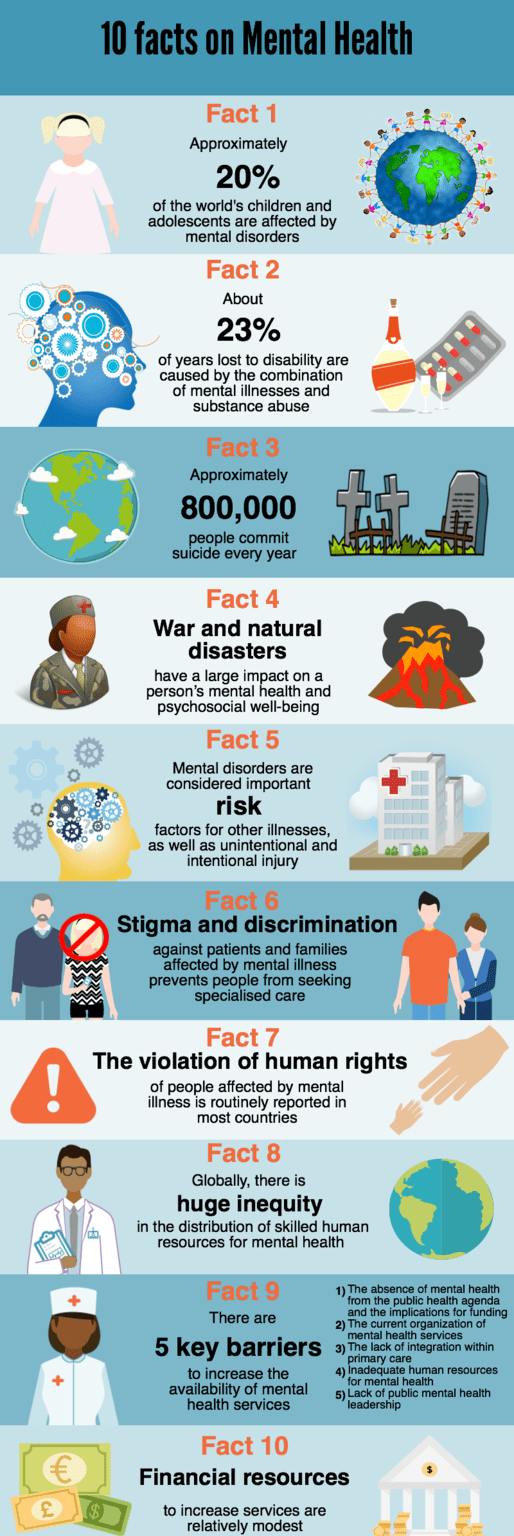Ady Marie Mandado
Mental Health Awareness
What is Mental Health?
Mental health refers to cognitive, behavioral, and emotional well-being. It is all about how people think, feel, and behave. People sometimes use the term “mental health” to mean the absence of a mental disorder. Mental health includes our emotional, psychological, and social well-being. It affects how we think, feel, and act. It also helps determine how we handle stress, relate to others, and make choices. Mental health is important at every stage of life, from childhood and adolescence through adulthood.

Different Kinds of Mental Illness
Anxiety
Depression
Paranoia
Anxiety disorders is a group of mental health disorders that includes generalised anxiety disorders, social phobias, specific phobias (for example, agoraphobia and claustrophobia), panic disorders, obsessive compulsive disorder (OCD) and post-traumatic stress disorder.
Depression is a mood disorder characterised by lowering of mood, loss of interest and enjoyment, and reduced energy. It is not just feeling sad.
Paranoia is the irrational and persistent feeling that people are ‘out to get you’. Paranoia may be a symptom of conditions including paranoid personality disorder, delusional (paranoid) disorder and schizophrenia.
Schizophrenia
Post-traumatic stress disorder
Schizophrenia is a complex psychotic disorder characterised by disruptions to thinking and emotions, and a distorted perception of reality. Symptoms of schizophrenia vary widely, but may include hallucinations, delusions, thought disorder, social withdrawal, lack of motivation and impaired thinking and memory. People with schizophrenia have a high risk of suicide.
Post-traumatic stress disorder (PTSD) is a mental health condition that can develop as a response to people who have experienced any traumatic event. This can be a car or other serious accident, physical or sexual assault, war-related events or torture, or natural disasters such as bushfires or floods.
Bipolar affective disorder
Bipolar affective disorder is a type of mood disorder, previously referred to as ‘manic depression’. A person with bipolar disorder experiences episodes of mania (elation) and depression. The person may or may not experience psychotic symptoms. The exact cause is unknown, but a genetic predisposition has been clearly established. Environmental stressors can also trigger episodes of this mental illness.
What is Mental Health Awareness?
Mental health means that were not only acknowledging that mental health is important, but were talking about it, putting it out there so that people who feel too much can get the help they need too. Awareness is the acceptance and understanding of something, in part or whole. It means learning about mental illness and being familiar with the vernacular of the movement. It means accepting the medical nature of it and not asking that people ‘get over it,’ when the solution is much more complex. Raising awareness to mental health can help combat and reduce the sigma against mental illness. Increasing the general mental health awareness whilst encouraging youth to self-recognize the need for help, as well as to help peers in need, may lead to fewer suicides. Mental health awareness increases the chances for early intervention, which can result in a fast recovery.
Specific actions to raise mental health awareness:
-
Learning more about mental health allows us to provide helpful support to those affected in our families and communities.
-
Mental Health Promotion is about creating environments that promote and sustain positive mental health for everyone.
-
Mental health awareness campaigns are all about destigmatizing mental health issues and starting productive dialogues on mental health issues.
-
Advocating within our circles of influence helps ensure these individuals have the same rights and opportunities as other members of your church, school and community.
-
Spread messages of hope to those in need. People who are suffering from mental health issues may need to speak with someone who can offer hope during difficult times. To learn how you can participate in spreading messages of hope, check out our Messages of Hope program.
Social Campaign Awareness
Mental health awareness campaign promotes to educate and inform people about mental health and how it can greatly affect our lives. The COVID-19 pandemic has had a major effect on our lives. Many of us are facing challenges that can be stressful, overwhelming, and cause strong emotions in adults and children. Public health actions, such as social distancing, are necessary to reduce the spread of COVID-19, but they can make us feel isolated and lonely and can increase stress and anxiety. A lot of people nowadays are committing suicide, especially students due to the stress and pressure of the new normal educational system. In today’s situation, the project of raising awareness of mental health is deeply necessary and needed. The mental health awareness campaign will help people gain knowledge on how to reduce stigma associated with mental illness, promote help seeking behaviors and emotional well-being practices, and prevent suicide.

